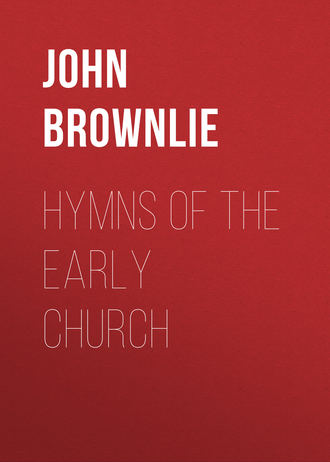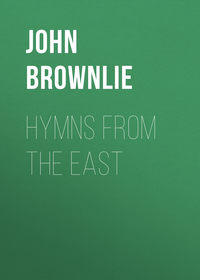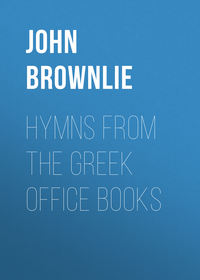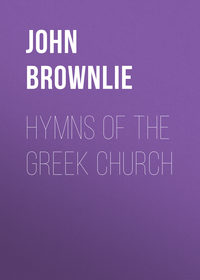 полная версия
полная версияHymns of the Early Church
Passion Week
VEXILLA REGIS PRODEUNT
By Venantius Fortunatus. Born in the district of Treviso, Italy, about 530. In 565 he made a pilgrimage to the shrine of St. Martin at Tours, and spent the remainder of his years in Gaul. Through the influence of his friend Queen Rhadegunda, Fortunatus became Bishop of Poitiers in 597. Some place his death in the year 609. Fortunatus must have been an author of great industry and versatility. He wrote the life of St. Martin in four books, containing 2245 hexameter lines; he threw off in profusion vers de societé when wandering from castle to cloister in Gaul; and he composed a volume of hymns for all the festivals of the Christian year, which is now unhappily lost. This is his best known hymn, Dr. Neale’s translation of which is inserted for the Fifth Sunday in Lent, otherwise called Palm Sunday, in “Hymns Ancient and Modern” (No. 84).
ISee the Royal bannersWave across the sky,Bright the mystic radiance,For the Cross is nigh;And He who came our flesh to wear,The Christ of God, was wounded there.IIDeep the cruel spear thrust,By the soldier given;Blood and water mingle,Where the flesh is riven;To cleanse our souls the crimson tideLeapt from the Saviour’s riven side.IIIIn the distant agesZion’s harp was strung,And the faithful saw Him,While the prophet sung;Now Israel’s Hope the nations see,For Christ is reigning from the tree.IVTree of wondrous beauty,Tree of grace and light,Royal throne to rest on,Decked with purple bright;The choice of God, this royal throneWhence Christ, the King, should rule His own.VSee the branches drooping!Laden, see they sway!For the price of heavenOn those branches lay;Ah! great the price, that price was paid,By Him on whom the debt was laid.PANGE, LINGUA, GLORIOSI, PRŒLIUM CERTAMINIS
This, “one of the first of the Latin mediæval hymns,” has been credited to St. Hilary. It has also been ascribed to Claudianus Mamertus, who died in 474. But by the majority of authorities it is regarded as the composition of Fortunatus, and ranks next to the Vexilla Regis prodeunt in their estimate. A rendering of it by Keble will be found in his “Miscellaneous Poems,” beginning, “Sing, my tongue, of glorious warfare,” which is Dr. Neale’s “Sing, my tongue, the glorious battle,” in a somewhat altered form.
ITell, my tongue, the glorious conflict,Crowned with victory nobly won; —More than all the spoil of battle,Praise the triumph of God’s Son;How by death the crown of conquestGraced Him when the strife was done.IIGrieving sore o’er Eden’s sorrowWhen our race in Adam fell;And the fatal fruit he tasted,Welcomed sin, and death, and hell;God ordained a tree in Zion,Eden’s poison to dispel.IIIIn the work of our RedemptionWisdom met the tempter’s foils; —On the ground he claimed, the VictorFought, and bore away the spoils;And the bane became the blessing,Freedom sprang amid his toils.IVFrom the bosom of the Father,Where He shared the regal crown,At the time by God appointed,Came the world’s Creator down —God incarnate, born of Virgin,Shorn of glory and renown.VList! the voice of infant weeping,Cradled where the oxen stand,And the Virgin mother watches,Tending Him with loving hand, —Hands and feet of God she bindeth,Folding them in swaddling band.VIBlessing, blessing everlasting,To the glorious Trinity;To the Father, Son, and Spirit,Equal glory let there be;Universal praise be given,To the Blessed One in Three.LUSTRA SEX QUI JAM PEREGIT
By some attributed to St. Ambrose, but generally and with greater probability to Fortunatus. There is an imitation of this hymn in English by Bishop Mant, beginning, “See the destined day arise!” one of the Passion hymns in “Hymns Ancient and Modern” (No. 99).
IThirty years by God appointed,And there dawns the woeful day,When the great Redeemer girds HimFor the tumult of the fray;And upon the cross uplifted,Bears our load of guilt away.IIAh! ’tis bitter gall He drinketh,When His heart in anguish fails; —From the thorns His life-blood trickles,From the spear wound and the nails;But that crimson stream for cleansing,O’er creation wide prevails.IIIFaithful Cross! in all the woodland,Standeth not a nobler tree;In thy leaf, and flower, and fruitage,None can e’er thy equal be;Sweet the wood, and sweet the iron,Sweet the load that hung on thee.IVNoble tree! unbend thy branches,Let thy stubborn fibres bend,Cast thy native rigour from thee,Be a gentle, loving friend;Bear Him in thine arms, and softly,Christ, the King eternal, tend.VOnly thou could’st bear the burdenOf the ransom of our race;Only thou could’st be a refuge,Like the ark, a hiding-place,By the sacred blood anointed,Of the Covenant of Grace.VIBlessing, blessing everlasting,To the glorious Trinity;To the Father, Son, and Spirit,Equal glory let there be;Universal praise be given,To the Blessed One in Three.CRUX AVE BENEDICTA
This little poem, which he pronounces “perfect in its kind,” is taken by Trench from Daniel’s Thesaurus, without any note of author or of date.
IHail, thou Blessed Cross, all hail!Death no longer can prevail.On those arms extended high,Did my King and Saviour die.IIQueen of all the trees that grow,Medicine when health is low,Solace to the cumbered heart,Comfort thou when sorrows smart.IIIO! most sacred wood, the signThat eternal life is mine;On the fruit thy branches give,Feeds the human heart to live.IVWhen, around the Judgment-seat,Friends of thine and foes shall meet,Be my prayer, O Christ, to Thee,And in love remember me.HORÆ DE PASSIONE D. N. JESU CHRISTI
From a fourteenth-century MS., where it bears the title, “Hours of the Passion of our Lord Jesus Christ, compiled from the Prophets and the New Testament by the Blessed Pope Urban” (b. 1302, d. 1370).
(AD PRIMAM)(Tu qui velatus facie)IVeiled was the glory of Thy face,O Jesus, Lord of heavenly grace,When mocking knees were bent in scorn,And bitter stripes were meekly borne.IITo Thee the prayer of faith we send,In Thee we hope: O Lord, attend,And in Thy mercy lead the wayTo where Thy glory shines as day.IIITo Thee be highest honours paid,O Christ, who wast by man betrayed,Who on the cross of anguish soreDidst die, that we might die no more.(AD TERTIAM)(Hora qui ductus tertia)IVO Christ, who in that hour of dreadForth as a sacrifice wast led;Who, to retrieve our grievous loss,Didst bear the burden of the cross.VO may Thy Love our hearts inflame;Be Thy pure life our constant aim;That we may win the heavenly rest,And share the glories of the blest.VITo Thee be highest honours paid,O Christ, who wast by man betrayed;Who on the cross of anguish soreDidst die, that we might die no more.(AD SEXTAM)(Crucem pro nobis subiit)VIIFor us the cruel cross He bare,Endured the thirst while hanging there —O Jesus! Thou hast anguish borne,Thy hands and feet with nails were torn.VIIIHonour and blessing be to Thee,O Christ, who hung upon the tree,Who, by the offering of Thy grace,Didst save from death our fallen race.(AD NONAM)(Beata Christi passio)IXThy blessed Passion, Christ, be ours,To set us free from Satan’s powers;To aid our fainting souls to riseTo joys prepared in Paradise.XTo Christ the Lord all glory be,Who, hanging on the shameful tree,Gave up His life with bitter cry,And saved a world prepared to die.XITo Thee be highest honours paid,O Christ, who wast by man betrayed,Who, on the cross of anguish sore,Didst die, that we might die no more.(AD COMPLETORIUM)(Qui jacuisti mortuus)XIIO spotless King, who shared its gloom,And lay at peace within the tomb,Teach us to find our rest in Thee,And sing Thy praise eternally.XIIICome to our help, O Lord, who gaveThy precious blood our souls to save;Lead us to Thine eternal peace,Whose sweetest joys shall never cease.Easter
FINITA JAM SUNT PRÆLIA
Of unknown date and authorship. It has not been traced further back than the Hymnodia Sacra, Munster, 1753.
IAlleluia! Alleluia!The din of battle now is dead,And glory crowns the Victor’s head;Let mirth abound,And songs resound – Alleluia!IIAlleluia! alleluia!The bitter pangs of death are past,And Christ hath vanquished hell at last;Cheers are ringing,Psalms are singing – Alleluia!IIIAlleluia! alleluia!And when the morn appointed broke,All decked with beauty Christ awoke;O shout with glee,Sing merrily – Alleluia!IVAlleluia! Alleluia!Hell hath He closed with His own hand,The gates of heaven wide open stand;Let mirth abound,And songs resound – Alleluia!VAlleluia! Alleluia!’Tis Thy wounds, O Blessed Jesus —’Tis Thy death from dying frees us,That living, weMay sing with glee – Alleluia!PLAUDITE, CŒLI!
A Jesuit hymn, taken by Walraff, in 1806, out of the Psalteriolum Cantiorum Catholicarum a Patribus Societati Jesu.
IShout praises, ye heavens,And sigh them, soft air;From highest to lowest,Sing, sing everywhere;For black clouds of tempestAre banished from sight;And spring, crowned with glory,Is pouring her light.IICome forth with the spring-time,Sweet flow’rets, and spreadYour rich hues around usWhere nature lay dead;Come, violets modest,And roses so gay,With lilies and marigolds,Spangle the way.IIIFlow joy song in fulness,Flow higher and higher;Pour forth thy sweet measures,Thou murmuring lyre;O sing, for He liveth,As truly He said,Yea, Jesus hath risenUnharmed from the dead.IVShout praises, ye mountains,Vales catch the refrain;Frisk gaily, ye fountains;Hills, tell it again —He liveth, He liveth,As truly He said;Yea, Jesus hath risenUnharmed from the dead.MORTIS PORTIS FRACTIS
By Peter of St. Maurice, sometimes styled Peter of Cluny, but best known as Peter the Venerable. Born in Auvergne, 1092 or 1094; began life as a soldier; afterwards became a Benedictine monk; elected abbot of the monastery of his order at Cluny in Burgundy; died there in 1156 or 1157. The greater part of his literary activity was given to the controversy between the Clugnian and Cistercian, or “black” and “white” monks. This Resurrection hymn is taken from “Some Rhythms, Proses, Sequences, Verses, and Hymns,” contained in the Bibliotheca Cluniacencis, 1623.
IBurst are the iron gates of death —A stronger power prevails;For, by the cross, the cruel kingBefore the Victor quails,O clear the light that shines afar,Where darkness held its sway,For God, who made the light at first,Restores its gladdening ray.IIThat sinners might for ever live,The great Creator dies,And by His death to new estateOur souls enraptured rise.There, Satan groaned in baffled hate,Where Christ our triumph won —For what to Him was deathly loss,To man was life begun.IIIHe grasps the envied prize, but fails,And while he wounds, he dies;But calmly, and with mighty power,The King secures the prize;And, leaving earth, His triumph won,He seeks His native skies.IVAnd now triumphant o’er the grave,The Lord to earth returns;To new create our fallen race,His soul with ardour burns;Down to the dwellings of the lost,To dwell with man He came;And hearts in grievous bondage held,Receive Him with acclaim.ALLELUIA, DULCE CARMEN
Found in three MSS. of the eleventh century in the British Museum Library, and published by the Surtees Society in the “Latin Hymns of the Anglo-Saxon Church,” from a MS. of the eleventh century, in Durham Library.
IAlleluia, hymn of sweetness,Joyful voice of ceaseless praise;Alleluia, pleasant anthem,Choirs celestial sweetly raise:This the song of those abidingIn the house of God always.IIAlleluia, Mother Salem,All Thy people joy in song;Alleluia, walls and bulwarksEvermore the notes prolong:Ah! beside the streams of Babel,Exiled, weep we o’er our wrong.IIIAlleluia, ’tis befittingThat our song should falter here;Alleluia, can we sing itWhen the clouds of wrath appear?To bemoan our sin with weeping,Now the time is drawing near.IVTrinity, for ever blessed!May we sing the gladsome lay,When from sin our souls are severed,And the clouds have passed away,And we share the Easter glory,In the realms of endless day?Ascension
ÆTERNE REX ALTISSIME
A hymn of complex authorship and of frequently altered text.
IEternal King, enthroned on high,Redeemer, strong Thy folk to save;Thee, powerful death, by death o’ercome,A royal crown of triumph gave.IIAscending to the throne of God,Beyond the glittering host of heaven,More power than human hand could giveTo Thee, victorious King, is given.IIIThree kingdoms bow before Thee now —The heavens above, the earth below,Hell’s dark abode – and to their Lord,On bended knee, submission show.IVAll awe inspired, the angel hostBehold man’s changed estate, amazed;Our sinful flesh, by flesh renewed,And man, true God, to Godhead raised.VO Christ, with God who dwell’st on high,Be Thou to us, we humbly pray,A lasting joy while here we wait,Our great reward in heaven for aye.VIIn earnest prayer we come to Thee;O may our sins be all forgiven,And lift our hearts by Thy rich grace,To where Thou art Thyself, in heaven.VIIThat when in clouds of Judgment dire,Thou com’st with Thine angelic host,We may escape the avenger’s power,And wear anew the crowns we lost.VIIITo Thee, O Christ, all glory be,Victor returning now to heaven;To Father, and to Holy Ghost,Let praise through endless years be given.POSTQUAM HOSTEM ET INFERNA
By Adam of St. Victor. (See p. 49.)
IBroken are the bands that bound us,Spoiled are Satan’s realms around us,And to joys supernal now,Christ returns with hosts attending,And, as when at first descending,Angel guards their homage bow.IIFar above the stars ascending,Faith alone His course attending,Passing now from mortal sight;To His hand all power is given,One with God He rules in heaven,One in honour and in might.IIIVictor on His throne uplifted,See all rule to Him is gifted,O’er Creation’s wide domain.Now for evermore He liveth,Nevermore His life He giveth —Once the sacrifice was slain.IVOnce He wore our flesh in weakness,Once He suffered, once in meeknessGave Himself for sin to die.Now no longer pain He knoweth:Perfect peace for ever floweth,Perfect joy is ever nigh.CŒLOS ASCENDIT HODIE
Of unknown date and authorship. The text is in Daniel’s Thesaurus, with “Alleluia” as a refrain. Dr. Neale gives it in his “Mediæval Hymns and Sequences” as “apparently of the twelfth century.”
ITo-day the lingering clouds are riven,Alleluia!Our glorious King ascends to heaven,Alleluia!IIThe heaven and earth His rule obey,Alleluia!Who sits at God’s right hand for aye,Alleluia!IIISee, all things are fulfilled at last,Alleluia!By David sung in ages past,Alleluia!IVAnd on the throne of high renown,Alleluia!The Lord is with His Lord set down,Alleluia!VNow blessings on our Lord we shower,Alleluia!In this chief triumph of His power,Alleluia!VILet praise the Trinity adore,Alleluia!To God be glory evermore,Alleluia!O CHRISTE, QUI NOSTER POLI
Appeared in the Cluniac Breviary of 1686, and in that of Paris, 1736, as also in later French Breviaries. From his connection with the revised Paris Breviary, this hymn has been ascribed to Archbishop Charles de Vintimille, born 1655, died 1746; but in neither the Cluniac nor Paris Breviary is it marked as his. Chandler’s version of the hymn, beginning, “O Jesu, who art gone before, To Thy blest realms of light,” appears in Dr. Martineau’s “Hymns of Praise and Prayer,” with opening lines altered to, “The Crucified is gone before, To the blest realms of light,” and with other variations.
IO Christ, who art ascended nowTo realms of bliss above,Inspire our souls to rise to Thee,Upborne by faith and love.IIMake us to seek those holy joys,That they who love receive;That earthly mind can never know,Nor faithless soul perceive.IIIThere, where Thou art, they reap rewardWho toiled at duty’s call;For Thou dost give Thyself to them,And Thou art all in all.IVBy power divine, O let us comeWhere glory cannot fade;And from Thy heavenly throne send downThe Spirit to our aid.VTo Thee who art at God’s right hand,O Christ, to Thee be praise,To Father, and to Holy Ghost,Be glory given always.Whitsuntide
VENI, CREATOR SPIRITUS,
MENTES TUORUM VISITA
Of the authorship of this grand hymn nothing unquestioned is known. It has been ascribed to Ambrose, Gregory, Rhabanus Maurus (died 856), and Charlemagne. The most widely prevalent opinion ascribes it to the last-named person, but in the judgment of Dr. Julian’s assistant-editor “the hymn is clearly not the work of St. Ambrose nor of Charles the Great. Nor is there sufficient evidence to allow us to ascribe it either to Gregory the Great, to Rhabanus Maurus, or to any of the ecclesiastics connected with the court of Charles the Fat.” The hymn has not yet been found in any MS. earlier than the latter part of the tenth century.
ICome, Thou Creator Spirit blest,And with Thy grace our minds pervade;May Thy sweet presence ever dwellWithin the souls which Thou hast made.IIThou Holy Paraclete! the GiftSent down to earth from God Most High,Thou Font of Life and fire and love,Thy holy unction now apply.IIISevenfold Thy gifts to us are given,Of God’s right hand the Finger Thou;The promise of the Father’s grace,With gifts of tongues, Thou dost endow.IVMake our dull sense enraptured glow,And let our hearts o’erflow with love;The weakness of our flesh inspireWith heavenly valour from above.VFar from our souls the foe repel,And let us know the bliss of peace;Guide Thou our steps, that evermoreOur hearts may learn from sin to cease.VILead us the Father’s love to know;Reveal to us the Eternal Son;And Thee, the Sent of both, we’ll praise,While everlasting ages run.VENI, SANCTE SPIRITUS ET EMITTE CŒLITUS
A sequence universally regarded as one of the masterpieces of sacred Latin poetry. As in the case of the Veni, Creator Spiritus, the authorship is matter of dispute. Robert II. of France, Hermannus Contractus (born 1013, died 1054), Stephen Langton the Archbishop of Canterbury, Pope Innocent III. – these have all in turn been credited with its production. Dr. Julian, the greatest living authority, sums up the matter of authorship thus: “The sequence is clearly not earlier than about the beginning of the thirteenth century. It is certainly neither by Robert II. nor by Hermannus Contractus. The most probable author is Innocent III.”
IHoly Spirit, come with power;Let Thy light, in darkest hour,Shine upon our onward way.Father of the humble heart,Come, Thy choicest gifts impart —Light our hearts with heavenly ray.IIThou canst best the heart console;Sweet Thy sojourn with the soul —Cooling breath at noon of day,Calm Thy rest in toil and care,Soft Thy shade in noontide glare —Thou dost chase our tears away.IIIO! Thou blessed Light of light!Let Thy beams in radiance brightFill our inmost heart for aye.If Thou come not with Thy grace,Nought of worth can take Thy place,Nought but leads the soul astray.IVWhat is filthy, come, renew;What is parched, with grace bedew;Heal the wounded in the way.What is stubborn, gently bend;To the chilled the life-glow send;Bring the erring ’neath Thy sway.VTo the faithful who reposeIn the love Thy grace bestows,Be Thy sevenfold gift alway —Rich reward for service given,Hope in death and joy in heaven,Joy untold that lasteth aye.O FONS AMORIS, SPIRITUS
By Charles Coffin. (See p. 3.) It is a recast of the Nunc nobis, Sancte Spiritus of St. Ambrose.
IO Holy Spirit, font of love,Thou source of life, and joy, and peace,With holy fire come from above,And bid our hearts their warmth increase.IIO Thou who didst with love’s strong cordUnite the Father and the Son,May we who love a common Lord,In mutual love be bound in one.IIINow to the Father throned on high,And unto Christ His only Son,And to the Spirit, glory be,Now, and while endless ages run.Trinity
TU TRINITATIS UNITAS
A cento. Added to the Roman Breviary in 1568. In a subsequent edition it is the hymn for Lauds on Trinity Sunday. It is made up of the first stanza of a hymn with the same opening, and of the third stanza of the composition, Æterna cœli gloria, with a doxology added.
IO Thou Eternal One in Three,Dread Ruler of the earth and sky,Accept the praise we yield to Thee,Who, waking, lift our songs on high.IIThe star that tells the approach of dayIs lingering in the glow of morn,And night and darkness fade away —O Holy Light, our souls adorn!IIITo God the Father throned in heaven,To Christ the One Begotten Son,And to the Spirit praise be given,Now, and while endless ages run.O PATER SANCTE, MITIS ATQUE PIE
Found in two MSS. of the eleventh century, and included in the York, Sarum, and Aberdeen Breviaries.
IO Holy Father, gracious Thou and tender;O Jesus Christ, Thou much adorèd Son;Spirit most sweet, Thou Paraclete, Defender,Eternally one!IITrinity Holy, Unity abiding,True God Thou art, unbounded goodness Thou,Light of the angels, trust of the confiding,We hope in Thee now.IIIThee all creation pays eternal homage;Thee all Thy creatures songs of glory raise;Now come we humbly, joining in the chorus,O hear Thou our praise.IVGlory to Thee, O God of power almighty,Triune yet One, and great Thou art and high;Hymns fitly tell Thy honour, praise, and glory,and eternally.ADESTO, SANCTA TRINITAS
Authorship unknown. It first occurs in a MS. of the eleventh century in the British Museum Library, has a place in the English Breviaries of York, Hereford, and St. Albans, and is printed in the “Latin Hymns of the Anglo-Saxon Church.”
IBe present, Holy Trinity,One glory Thou, one Deity;Where’er creation’s bounds extend,Thou art beginning without end.IIThe hosts of heaven Thy praise proclaim,Adoring, tell Thy matchless fame;Earth’s threefold fabric joins the song,To bless Thee through the ages long.IIIAnd we, Thy humble servants, nowTo Thee in adoration bow;Our suppliant vows and prayers uniteWith hymns that fill the realms of light.IVOne Light, we Thee our homage pay,We worship Thee, O triple ray;Thou First and Last, we speak Thy fame,And every spirit lauds Thy name.VPraise to the Eternal Father be;Thou only Son, all praise to Thee;And Holy Ghost to Thee be praise,Great Triune God, yet One always.All Saints
PUGNATE, CHRISTE MILITES
Given in editions of the Paris Breviary subsequent to 1736, along with the hymn Cœlestis O Jerusalem, for the vigil of All Saints Day at Lauds. Author not traced.
IChristian soldiers in the conflict!Bear the banner of the cross;Rich reward shall crown the victor,More than recompense for loss.IINot with paltry palms that witherShall the brow be gaily crowned,But with light that shines eternal,And with heavenly joy renowned.IIIYours are mansions fair and comely —There your souls in bliss shall rest;Stars shall sparkle in their radiance,On the pathway of the blest.IVEarthly joys are faint and fleeting,Earthly favours quickly fade;Heavenwards lift your eyes, expectingThere your true reward is laid.VGod be praised who crowns the victor,Christ be praised who saves from sin;Equal praise to God the Spirit,By whose aid we fight and win.AUDI NOS, REX CHRISTE
This pilgrim or processional hymn was first published from a MS. of the eleventh century by Du Mévil at Paris, 1847; reprinted by Neale in his Hymni Ecclesiæ, in 1851, as Cantus Peregrinatorum.
IHear us, O Christ, our King;Lord, hear the prayer we bring,And take the ordering of our way.RefrainThy mercy, Lord, extend;Thy mercy, Lord, extend,And take the ordering of our way.IIO Three in Unity!Protect us all each day:In this Thy path divine we pray.IIISend us a faithful guide:An angel to abide,Whose hand shall lead us to Thy throne.IVOur upward path direct,From every foe protect,And bring us back to claim our own.VThy strong right arm extend,And with Thy left defend,And save us from the enemy.VIO Thou Creator wise,Soon may our longing eyesThe glory of Thy kingdom see.VIINow glory let there be,O Father, unto Thee,From age to age eternally.Communion
EJA O DULCIS ANIMA




